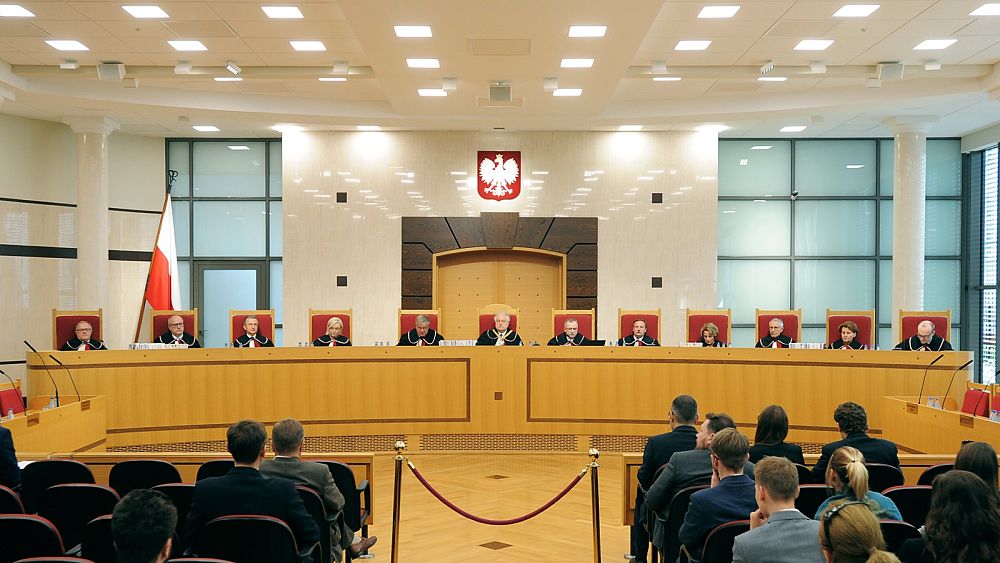World
Poland’s legal overhaul infringes on judicial independence, ECJ rules

The controversial reform has caused an intense and protracted dispute between the Polish government and the European Commission.
Poland’s judicial reform infringes upon European law because it undermines the right to have access to an independent and impartial judiciary, the European Court of Justice (ECJ) has said in a highly-anticipated ruling.
“The value of the rule of law is an integral part of the very identity of the European Union as a common legal order and is given concrete expression in principles containing legally binding obligations for the member states,” the judges said on Monday afternoon.
“The measures thus adopted by the Polish legislature are incompatible with the guarantees of access to an independent and impartial tribunal, previously established by law.”
The ruling is an unambiguous rejection of the reform introduced in 2019 by the hard-right government of the Law and Justice (PiS) party, which sparked an intense dispute between Warsaw and Brussels.
The contentious reform changed the rules that govern the relations between courts, preventing judges from assessing each other’s compliance with EU legal standards and questioning a tribunal’s composition.
It also empowered the disciplinary chamber of the Supreme Court to punish magistrates according to the content of their verdicts. Possible penalties included a reduction of salary, the temporary suspension of duties and the waiver of immunity to allow the initiation of criminal proceedings.
The chamber has been repeatedly criticised by the European Commission, the United Nations and civil society organisations as a political tool to exert control over the judiciary and weaken the separation of powers.
The Commission filed a legal case before the ECJ in March 2021 after its negotiations with the Polish government failed to deliver a satisfying result.
Warsaw struck a defiant tone and insisted the reform was necessary to purge the influence of the communist era, strengthen the apolitical character of the judiciary and crack down on corruption.
The European Court of Justice later ruled the chamber was incompatible with EU law and imposed a series of interim measures and ordered its dismantlement.
Poland’s continued refusal to comply with the interim measures led the ECJ to slap a record-breaking €1 million fine per day on the country, which was reduced to €500,000 a day after the disciplinary body was replaced with a “chamber of professional responsibility.”
The fine is being deducted from Poland’s allocation of the EU budget and ceases to apply as of Monday.
Poland now owes €534 million, according to the European Commission, a sum accrued between October 2021, when the fine was established, and April 2023, when it was downsized.
‘Risks of undue stigmatisation’
In its new ruling, which is final and cannot be appealed, the ECJ offers a total denunciation of Poland’s justice reform law.
The court decries the reform’s “broad and imprecise” provisions and the chilling effect it created on Polish magistrates, who were under threat of retaliation for conducting an effective review of judicial decisions.
The ruling reaffirms the ECJ’s previous position on the chamber’s illegal powers and challenges the obligations related to personal data. Polish judges were required to disclose by writing their affiliation with political parties, civil associations and NGOs.
“The placing online of information relating to past membership of a political party is not, in the present case, appropriate for attaining the alleged objective of strengthening the impartiality of judges,” the judges said.
The disclosure is “liable to expose judges to risks of undue stigmatisation, by unjustifiably affecting the perception of those judges by individuals and the public in general.”
Reacting to the news, Didier Reynders, the European Commissioner for justice, welcomed the ruling and urged the Polish authorities to comply in full.
“Today is an important day for the restoration of an independent justice in Poland,” Reynders said in a short statement. “Any regression on the organisation of justice must be prevented.”
From Warsaw, Zbigniew Ziobro, Poland’s justice minister and one of the key architects behind the reform, expressed his displeasure, saying the ECJ was a “corrupt” tribunal and its decisions were not written by judges “but by politicians.”
Despite its combative rhetoric, the Polish government has already tabled legislation to address the most controversial aspects of the overhaul and secure the release of its €35-billion share of the EU’s COVID-19 recovery fund, which Brussels is currently withholding.
But in February, Polish President Andrzej Duda shocked the country when he chose to send the draft law to the Constitutional Tribunal for a legal review, further delaying its implementation.

World
Cartier owner Richemont posts 10% increase in Q3 sales

World
Ancient Pompeii excavation uncovers lavish private bath complex

Archaeologists have unearthed a lavish private bath complex in Pompeii, highlighting the wealth and grandeur of the ancient Roman city before it was destroyed by Mount Vesuvius in AD 79, the site said on Friday.
The baths, featuring hot, warm and cold rooms, could host up to 30 guests, allowing them to relax before heading into an adjacent, black-walled banquet hall, decorated with scenes from Greek mythology.
ITALY’S ANCIENT POMPEII PARK CRACKS DOWN ON DAILY VISITORS TO COMBAT OVERTOURISM
The pleasure complex lies inside a grand residence that has been uncovered over the last two years during excavations that have revealed the opulent city’s multifaceted social life before Vesuvius buried it under a thick, suffocating blanket of ash.
A central courtyard with a large basin adds to the splendour of the house, which is believed to have been owned by a member of Pompeii’s elite in its final years.
“This discovery underscores how Roman houses were more than private residences, they were stages for public life and self-promotion,” said Gabriel Zuchtriegel, director of the Pompeii Archaeological Park.
The private thermal baths complex discovered by archaeologists in a villa of the ancient city of Pompeii is seen in Pompeii, Italy, in this undated handout picture released on January 17, 2025. (Pompeii Archeological Park/Ministry of Cultural Heritage and Activities and Tourism/Handout via REUTERS )
Zuchtriegel said the layout recalled scenes from the Roman novel “The Satyricon”, where banquets and baths were central to displays of wealth and status.
Decorated with frescoes, the complex draws inspiration from Greek culture, emphasizing themes of leisure and erudition.
“The homeowner sought to create a spectacle, transforming their home into a Greek-style palace and gymnasium,” Zuchtriegel said.
The remains of more than 1,000 victims have been found during excavations in Pompeii, including two bodies inside the private residence with the bathhouse – a woman, aged between 35-50, who was clutching jewellery and coins, and a younger man.
The discovery of their bodies was announced last year.
World
‘Fields were solitary’: Migration raids send chill across rural California

Los Angeles, California — Recent raids carried out by the United States Customs and Border Protection (CBP) in a rural California county have struck fear into immigrant communities as President-elect Donald Trump prepares to return to the White House.
CBP says that the operation in Kern County, which took place over three days in early January, resulted in the detention of 78 people. The United Farm Workers (UFW) union says it believes the number is closer to 200.
“The fields were almost solitary the day after the raids,” a 38-year-old undocumented farmworker named Alejanda, who declined to give her last name, said of the aftermath.
She explained that many workers stayed home out of fear. “This time of year, the orchards are usually full of people, but it felt like I was by myself when I returned to work.”
The raids are being seen by local labourers and organisations like UFW as a shot across the bow from immigration enforcement agencies before Trump’s inauguration on Monday.
His second term as president is expected to ring in a new era of enhanced restrictions and deportation efforts.
While the number of people arrested represents a small fraction of the hundreds of thousands of undocumented workers underpinning California’s agricultural sector, the anxieties caused by such raids extend far beyond those detained.
“On Wednesday [the day after the raids], I stayed home from work. I barely left my house,” said Alejanda, adding that she kept her five-year-old son home from daycare rather than risk driving to drop him off.
“Everyone is talking about what happened. Everyone is afraid, including me. I didn’t actually see any of the agents myself, but you still feel the tension.”
Emboldened agencies
Following a presidential campaign where he routinely depicted undocumented migrants as “criminals” and “animals”, Trump will likely try to fulfill his promise to carry out the “largest deportation programme” in the country’s history on his first day in office.
About 11 million people live in the United States without legal documentation, some of whom have worked in the country for decades, building families and communities.
The January arrests in Kern County appear to be the first large-scale Border Patrol raid in California since Trump’s victory in the November election, which set off speculation about the potential impact of mass deportations on immigrant communities and the economic sectors dependent on their labour.
About 50 percent of California’s agricultural workforce is made up of undocumented immigrants.
In California, undocumented status has been cited as a source of persistent anxiety for workers — as well as a means of leverage for employers, who often pay such labourers lower wages and grant them fewer protections in the fields.
But Alejanda says that workplace raids like the ones that took place in Kern County have not been common in the area.
“I have been here for five years and never experienced anything like this before,” she said, noting that workers were detained while leaving the fields to go home.
CBP said in a statement that the operation, named “Return to Sender”, had targeted undocumented people with criminal backgrounds and connections to criminal organisations.
#WeFeedYou pic.twitter.com/8e6GE9RRkK
— United Farm Workers (@UFWupdates) January 11, 2025
The raids were carried out by agents from the CBP El Centro Sector, located near the border between Mexico and southern California, more than five hours by car from the site of the raids.
“The El Centro Sector takes all border threats seriously,” Chief Patrol Agent Gregory Bovino said in a press release. “Our area of responsibility stretches from the US/Mexico Border, north, as mission and threat dictate, all the way to the Oregon line.”
Antonio De Loera-Brust, a spokesperson for UFW, said that the operation shows that agencies like CBP are likely to become more aggressive as Trump takes office.
He also disputed CBP’s characterisation of the raids as focused on people with criminal records, saying that the operation cast a wide net and profiled people who looked like farmworkers.
Two of those arrested were UFW members, whom the organisation described as fathers who had lived in the area for more than 15 years.
“By operating over 300 miles north of the Mexican border, and apparently conducting this untargeted sweep based on profiling on their own initiative and authority, Border Patrol has shown itself to be clearly emboldened by a national political climate of hostility towards hard-working immigrant communities,” De Loera-Brust told Al Jazeera.
“It’s certainly deeply concerning that this sort of operation could be the new normal under the incoming Trump administration.”
-
/cdn.vox-cdn.com/uploads/chorus_asset/file/25822586/STK169_ZUCKERBERG_MAGA_STKS491_CVIRGINIA_A.jpg)
/cdn.vox-cdn.com/uploads/chorus_asset/file/25822586/STK169_ZUCKERBERG_MAGA_STKS491_CVIRGINIA_A.jpg) Technology1 week ago
Technology1 week agoMeta is highlighting a splintering global approach to online speech
-

 Science7 days ago
Science7 days agoMetro will offer free rides in L.A. through Sunday due to fires
-
/cdn.vox-cdn.com/uploads/chorus_asset/file/23935558/acastro_STK103__01.jpg)
/cdn.vox-cdn.com/uploads/chorus_asset/file/23935558/acastro_STK103__01.jpg) Technology6 days ago
Technology6 days agoAmazon Prime will shut down its clothing try-on program
-

 News1 week ago
News1 week agoMapping the Damage From the Palisades Fire
-

 News1 week ago
News1 week agoMourners Defy Subfreezing Temperatures to Honor Jimmy Carter at the Capitol
-
/cdn.vox-cdn.com/uploads/chorus_asset/file/25826211/lorealcellbioprint.jpg)
/cdn.vox-cdn.com/uploads/chorus_asset/file/25826211/lorealcellbioprint.jpg) Technology6 days ago
Technology6 days agoL’Oréal’s new skincare gadget told me I should try retinol
-
/cdn.vox-cdn.com/uploads/chorus_asset/file/25832751/2192581677.jpg)
/cdn.vox-cdn.com/uploads/chorus_asset/file/25832751/2192581677.jpg) Technology2 days ago
Technology2 days agoSuper Bowl LIX will stream for free on Tubi
-

 Business4 days ago
Business4 days agoWhy TikTok Users Are Downloading ‘Red Note,’ the Chinese App


















